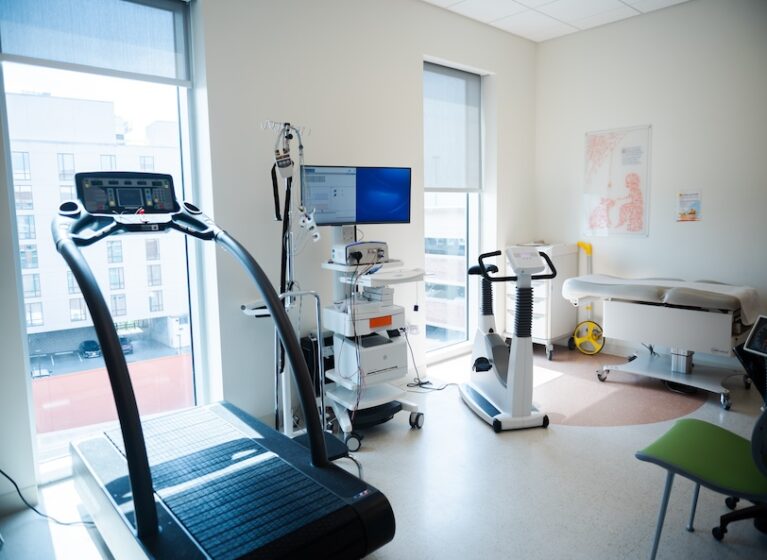
Over half of school-aged children, or about 26.8 million, in America participate in organized sports. If you expand that number to include kids who don’t participate in traditional sports but enjoy running, rock climbing, or dance, it’s an even larger number. Up to 70% of all children report enjoying a physically demanding activity.
When these kids have a sudden blackout or chest pain with exercise, they need a heart assessment. But how have their athletic pursuits affected their heart’s function?
In his recent publication on the Cardiovascular Care of the Pediatric Athlete, pediatric sports cardiologist Peter Dean, MD, posits that the care for these children must be anchored in an understanding of the unique changes possible through exercise and physical activity.
Who Is the Pediatric Athlete?
While the child playing pickleball with their family on a Saturday morning is certainly engaging in a healthy activity, it’s unlikely they would have substantial athletic-induced cardiac changes.
Instead, the determination of who is a pediatric athlete (and whether or not cardiac changes are expected) incorporates several considerations:
- Duration and intensity
- Type of exercise or sport
- Training history
- Skill level
Pediatric Cardiovascular Changes From Exercise
It’s well-documented that working out changes your heart, mostly for the better. But when assessing a patient for a problem, it can present unique challenges.
“Let’s say I have a cross-country runner. They may have a slower heart rate, and their heart may appear slightly larger compared to a typical child. Those changes could be due to a problem or only normal changes from running,” Dean shares.
For adults, there’s more data for comparison. But with pediatrics, fewer data points exist.
Researchers have observed exercise induced cardiac remodeling in children as young as 12. They have also observed electrical adaptations. These changes can sometimes make test results look notably different than those of their less-athletic peers.
Managing Ongoing Heart Conditions
In addition to seeing pediatric athletes with new-onset problems, sports cardiologists also help another growing group, individuals with congenital heart disease. As congenital heart defect treatment improves, these children also want to participate.
But participation for them requires shared decision-making with providers who are familiar with the intricacies of their specific condition and medical history. Pediatric sports cardiology can offer evidence-based suggestions with an understanding of both their patients' condition and the demands of athletics.
Additional screenings can help keep these children safe while fostering their interest in athletics. These same principles can apply to managing the care of children who have inherited heart problems, such as hypertrophic cardiomyopathy or long QT syndrome.
Our Sports Cardiology Expertise
College football and basketball players in Division 1 NCAA schools are at the greatest risk for sudden cardiac arrest. So, it’s no wonder that UVA Health Children’s was among the first to focus on the best methods to screen pediatric athletes.
While many colleges now do an ECG and physical for athletes starting in their program, UVA’s program goes a step further. We've developed a streamlined approach to interpret ECGs at the time of meeting the athlete in clinic and, when needed, they can perform an echocardiogram, exercise stress test, or cardiac monitor in the same visit. This limits the amount of time that athletes are restricted or are waiting for test results. We also have advanced imaging capabilities, including MRI, CT, and stress echocardiograms can help clarify any irregularities that are found.
Every school year brings an influx of over 200 new athletes who need to be screened, everyone from football players to CavMan. This means that our team sees a high volume of high-performing athletes, and we have experience with both the medical and the human elements of these screenings. Whether it’s a 1st yearn beginning their first season as a Cavalier or a high school student running cross-country with friends, our team brings our best to every appointment.
In addition to needing to know about the complexities of the heart, it’s also important to understand the mindset of young people who are passionate about participating in athletics. Even knowing they need a screening can lead to sudden onsets of nervousness and fear. But by conducting the screening package together with an experienced team, we can help put them at ease, and reassure them that despite test results that may look abnormal, they’re healthy.
Teaming Up for Your Patients
Dean’s specialty is sports cardiology, but he's part of a large team of pediatric cardiologists ready to help handle any abnormal finding or concern. From imaging experts, to cardiomyopathy experts, to cardiovascular genetics specialists, and implantable device and arrhythmia experts, there’s a wealth of pediatric heart experience in the Battle Building. This team can handle any cardiac concern an athlete may have.
But the Battle Building also houses many floors of specialists who can evaluate athletes when symptoms are not cardiac-related. When an athlete comes in struggling with air hunger, whether it’s a problem with the heart, the lungs, or just not enough iron, we have the specialists we need to get to the bottom of their problem so they can keep participating. Equipped with the information they need about their patients' test results and diagnoses, primary care providers have ongoing support in managing their patient's care.
A Growing Specialty
While rare, the sudden death of pediatric athletes due to heart conditions has everyone looking for better answers for patients whose heart results just seem a little off. And as more children with inherited and congenital heart problems are given a better future, it’s natural that they’d want to safely participate in something that many of their peers enjoy.
Pediatric sports cardiology is a newer specialty, but one that closes a gap in care. For cardiologists unsure about what is and isn’t normal in pediatric patients, and for pediatricians handling CHD patients who want to be more active, these second opinions are crucial in offering the best care.